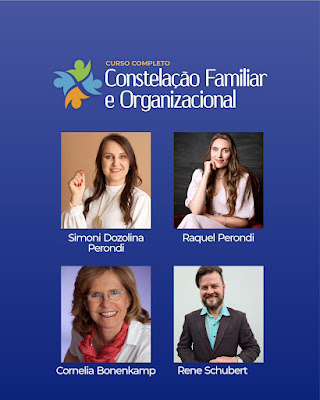Pesquisar neste blog
09/06/2025
I Congresso Internacional de Educação Socioemocional Sistêmica - Curitiva/PR
04/06/2025
Vitimizo ou Perpetro?
Workshop: Vitimizo ou Perpetro - presencial em Campinas/SP
29/05/2025
Eu defronte a mim...
"O passo decisivo para o crescimento é quando alguém de repente se encontra diante de sua impotência, olho no olho, e assume: aqui sou pequeno."
Bert Hellinger
28/05/2025
Formação em Constelação Familiar e Organizacional
Já pensou em ter novas possibilidades profissionais?
Que você possa ter liberdade geográfica, trabalhar de sua casa, ajudar pessoas e empresas?
26/05/2025
A maioria dos brasileiros são miscigenados.
22/05/2025
Coletânea de livros "Orientação Familiar"
Livro pode ser encontrado nas livrarias, na Literare ou encomendado comigo pelo email: rene.schubert@gmail.com
19/05/2025
Lançamento de Livro: Pensamento Sistêmico
Pensamento Sistêmico - Volume 2
Coordenação: Fabiana Quezada
Editora Leader
Data: 06.06 a partir das 19 horas
Local: Livraria Cultura - Av. Angélica, 1212 - Higienópolis
28/04/2025
Perspectiva
"Todo ponto de vista é a vista de um ponto.
Para entender como alguém lê, é necessário saber como são seus olhos e qual é a sua visão do mundo"
Leonardo Boff
Na infinidade de pontos de vista, cada um revela uma faceta única da verdade, mostrando que nossa perspectiva é tanto uma janela para o mundo quanto um reflexo do nosso próprio ser.
- Pensar (passado):O que em minha história moldou a forma como vejo o mundo hoje?
- Sentir (presente): Como meus sentimentos atuais influenciam minha percepção e compreensão dos eventos ao meu redor?
- Agir (futuro): De que maneira minhas ações futuras podem transformar ou expandir minha visão de mundo?

.jpg)
.jpg)
.jpg)













